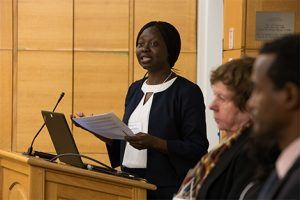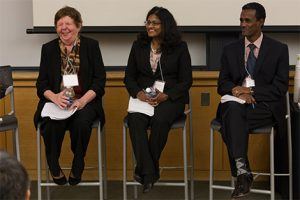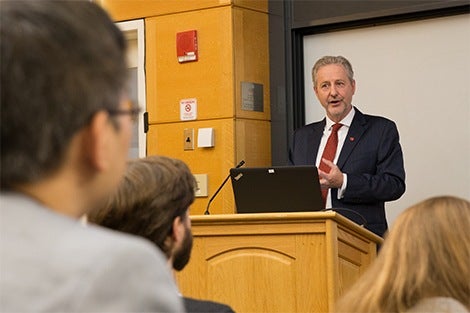Conference provides window into issues at the intersection of nutrition and health, agriculture, and environment
November 21, 2017 – The world produces more food than ever before, yet an estimated 200 million people in Africa lack adequate nutrition, in part due to challenges ranging from drought and civil unrest to crop-destroying insects and sanitation problems. A coordinated, interdisciplinary approach among experts in agriculture, nutrition, environment, and public health is needed to help address these complex health and development challenges and to facilitate providing nutritious food to the undernourished, according to experts who spoke at a conference on African nutrition and health.
The Agriculture, Nutrition, Health and the Environment in Africa conference was held November 6-7, 2017 at the Joseph B. Martin Conference Center at Harvard Medical School and at Harvard Kennedy School. Students, researchers, faculty, and public health professionals from around the world participated.
“Agriculture is one of the greatest human success stories ever told—how humans modified the environment to generate food and natural resources,” said keynote speaker Patrick Webb, the Alexander McFarlane Professor of Nutrition at the Tufts University Friedman School of Nutrition Science and Policy. While the world produces 2.6 billion tons of grains annually, more than 50% of the African continent is food insecure, he said. “There’s a huge gap.”
In her opening remarks, Harvard Chan School Dean Michelle A. Williams said undernutrition encompasses a broad range of topics that are increasingly important and can’t be addressed separately or by any one discipline. These issues are of critical importance in Africa, where populations are growing and urbanizing rapidly. Food systems must be designed to meet the challenges of malnutrition and noncommunicable diseases and they must be done sustainably, said Williams.

In his keynote address, Webb said much of the focus on agriculture globally has been on boosting production to generate income, and less attention has been paid to improving the nutrient adequacy of food and increasing access to the undernourished. “Agriculture is being asked to do a lot more than it used to be,” he said. Webb cited efforts by producers to grow more nutritious food, grow food more sustainably by using less water and fewer chemicals, and produce more crops for growing populations but with fewer greenhouse gases that contribute to climate change.
He gave some examples of the challenges of keeping families nourished, particularly in rural areas:
- A farmer’s harvest is stored in a damp, humid environment, enabling mold, insects, and rodents to taint the crop that is then eaten by family members who become sick.
- A family has livestock to generate income and food, but the animals are brought into the house to live, leading to unsanitary conditions that may harm the family’s health.
- A family grows fruits and vegetables or raises poultry, but they are consumed only by older family members, not by young children at risk of stunted growth or by young women of child-bearing age at risk of producing low birth weight babies.
Webb said multidisciplinary meetings like the Harvard conference and more education and training programs for professionals and students are needed. “There’s no one size fits all [solution] but I remain optimistic. We must take it one step at a time.”

Other speakers included Wafaie Fawzi, Richard Saltonstall Professor of Population Sciences and chair, Department of Global Health and Population, who co-chairs the Walker Study Group, which brings together students from Harvard Chan School and Harvard Kennedy School to investigate domestic and global health systems change at the intersection of nutrition and agriculture. Ramadhani Abdallah Noor, doctoral candidate in nutrition epidemiology at Harvard Chan School and a research scientist at the Harvard-affiliated Africa Academy for Public Health in Tanzania, moderated the event. Harvard Chan School and AAPH have worked with partners across sub-Saharan Africa for over 40 years to advance public health research and education in the region. Other Harvard Chan participants included Christopher Golden, research scientist in the Department of Environmental Health and associate director of the Planetary Health Alliance; Lindsay Jaacks, assistant professor of global health; and Walter Willett, professor of epidemiology and nutrition.
The event was a collaboration between Harvard T.H. Chan School of Public Health, the Harvard Kennedy School Belfer Center for Science and International Affairs, Harvard University Center for African Studies, and the Africa Academy for Public Health.
Photos: Sarah Sholes
